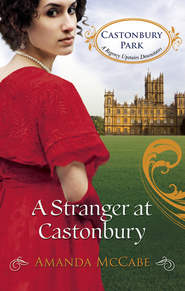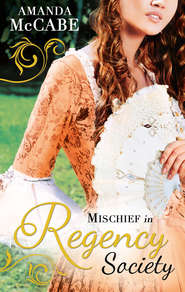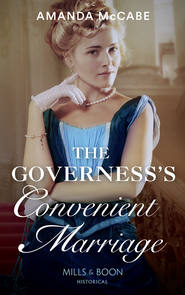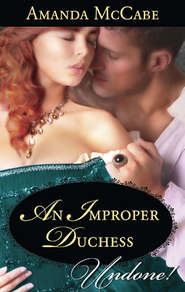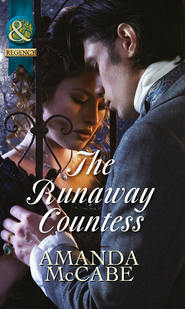По всем вопросам обращайтесь на: info@litportal.ru
(©) 2003-2025.
✖
Christmas At The Tudor Court: The Queen's Christmas Summons / The Warrior's Winter Bride
Настройки чтения
Размер шрифта
Высота строк
Поля
‘He can do much indeed. I hear from your tutors that you are most adept, John, especially at languages,’ Sir Matthew said, turning away from Edward and beckoning John closer. ‘That you should be sent to Cambridge next term. Do you enjoy your studies?’
Somewhere deep inside of John, in a spot he had thought long numbed, hope stirred. ‘Very much, my lord. I know my Greek and Latin quite well now, as well as French and Spanish, and some Italian.’
‘And your skills with the bow and the sword? How are they?’
John thought of the stag he had brought down for the supper table, one clean arrow shot. ‘Not bad, I think. You can ask the sword master at my school, I work with him every week.’
‘Hmm.’ Sir Matthew studied John closely, tapping his fingers against his sleeve. ‘And you are handsome, too.’
‘He gets it from his cursed mother,’ Edward muttered. ‘Those eyes...’
Sir Matthew peered closer. ‘Aye, you do have a dark Spanish look about you, John.’ He poured out even more wine and handed it to Edward without another glance. ‘Come, John, let us walk outside for a time. I haven’t long before I must ride back.’
John followed his godfather into the abbey garden. Like the house, they had once been a grand showplace, filled with the colour and scent of rare roses, the splash of fountains. Now it was brown and dead. But John felt more hope than he had in a long while. School had been an escape from home, a place where he knew he had to work hard. Was that hard work finally going to reward him? And with what?
‘You said I might be able to do much indeed, my lord,’ he said, trying not to appear too eager. To seem sophisticated enough for Cambridge and a career beyond. Maybe even something at court. ‘I hope that may be true. I wish to serve the Queen in any way I am able.’ And maybe to redeem the Huntley name, as well, if it was not lost for good. To bring honour to his family again would mean his life had a meaning.
Sir Matthew smiled. ‘Most admirable, John. The Queen is in great need of talented and loyal men like you, now more than ever. I fear dark days lie ahead for England.’
Darker days than now, with Spain and France crowding close on all sides, and Mary of Scotland lurking in the background at every moment? ‘My lord?’
‘The Queen has always had many enemies, but now they will grow ever bolder. I hope to raise a regiment to take to the Low Countries soon.’
‘Truly?’ John said in growing excitement. To be a soldier, to win glory on the battlefield—sure that would save the name of Huntley. ‘Might there be a place for me in your household there, my lord?’
Sir Matthew’s smile turned wry. ‘Perhaps one day, John. But you must finish your studies first. A mind like yours, adept at languages, will be of great use to you.’
John hid his flash of disappointment. ‘What sort of place might there be for me, then?’
‘Perhaps...’ Sir Matthew seemed to hesitate before he said, ‘Perhaps you have heard of my friend Sir Francis Walsingham?’
Of course John had heard of Walsingham. He was the Queen’s most trusted secretary, the keeper of many secrets, many dangers. ‘Aye, I know of him.’
‘He recently asked me about your progress. If matters do come to war with Spain, a man with connections and skills such as yours would be most valuable.’
John’s thoughts raced, a dizzying tidal pool of what a man like Walsingham might ask of him. ‘Because I am half-Spanish?’
‘That, of course, and because of your intelligence. Your—intuition, perhaps. I noticed it in you when you were a boy, that watchfulness, that—that knowledge. It is still there. Properly honed and directed, it will take you far.’
‘You think there will be danger from Spain soon? Is that why you are going to the Low Countries to fight them there?’
‘There will always be danger from Spain, my dear lad. Who knows what will happen in a few years, when you have finished your studies? Now, why don’t you tell me more of your schooling? What have you learned of mathematics there, of astronomy?’
John walked with Sir Matthew around the gardens back to the drive at the front of the house, where a servant waited with his horse. He told him about his schooling and asked a few questions about court, which Sir Matthew answered lightly.
‘Keep up with your studies, John, and do not worry about your father. I will see he comes to no harm,’ Sir Matthew said as he swung himself up into his saddle. ‘I must go now, but you will think about what I have said?’
‘Of course, my lord.’ John was sure he would think of little else. He bowed, and watched his godfather gallop away.
John looked back at the house. In the fading sunlight, Huntleyburg Abbey looked better than usual, its patches and cracks disguised. He would so love to restore it, to see its beauty come back to life, but he had never known how he would do that. Mayhap he could do it with secrets—Walsingham’s secrets, England’s secrets. But what would that be like? What path would his life follow? He wasn’t sure.
But he knew that if it took spy craft, working in the shadows, living half a life to restore the Huntley name his father had so squandered, he would do it. He would do anything, make any sacrifice, to bring back their honour. He vowed it then and there, to himself and his family. That would be his life.
Chapter Two (#ub6f0dc84-124d-5b66-b5aa-ce18b01a9881)
Galway—early summer 1588
Alys, carrying a basket of linen to the laundry above the kitchens of Dunboyton Castle, heard an all-too-familiar sound floating up the stone stairs—the wailing sobs of some of the younger maidservants. Their panic had been hanging like a dark cloud over Dunboyton for days.
Not that she could blame them. She herself felt constantly as if she walked the sharp edge of a sword, about to fall one way or the other, but always caught in the horrible uncertainty of the middle. They said the Spanish Armada had left its port in Lisbon and was on its way to England, to conquer the island nation and all her holdings, including Ireland. Hundreds of ships, filled with thousands of men, coming to wage war.
She wished she could somehow banish the rumours that flew like dark ghosts down the castle corridors. It made her want to scream out in frustration.
Yet she could not. She was the lady of the castle now, as she had been in the nine years since her mother had died. She had to set an example of calm and fortitude.
She stepped into the laundry, and put down her basket with the others. She saw that the day’s work was not even half-finished, with linens left to boil unsupervised in the cauldrons, the air filled with lavender-scented steam so thick she could barely see through it.
‘Oh, my lady!’ one of the maids, young Molly, wailed when she saw Alys. ‘They do say that when the Spanish come, we will all be horribly tortured! That in their ships they carry whips and nooses, and brands to mark all the babies.’
‘I did hear that, too,’ another maid said, her voice full of doomed resignation. ‘That all the older children will be killed and the babies marked so after all might know their shame of being conquered.’
‘Don’t be silly,’ the old head laundress said heartily. ‘We will all be run through with swords and tossed over the walls into the sea before we can be branded.’
‘They say the Dutch in Leiden burned their own city to the ground before they let it fall into Spanish hands,’ another said. ‘We shall have to do the same.’
‘Enough!’ Alys said sternly. If she heard once more about the rumoured cruelties of the Spanish, people who were nowhere near Ireland, she would scream. What would her mother have said about it all? ‘If they are sailing at all, they are headed to England, not here, and they shall be turned back before they even get near. We are in no danger.’
‘Then why are all the soldiers marching into Fort Hill?’ Molly asked. ‘And why is Sir Richard Bingham riding out from Galway City to inspect the fortifications?’
Alys wished she knew that herself. Bingham had a cruel reputation after so bloodily putting down the chieftains’ rebellions years before; having him roaming the countryside could mean nothing good. But she couldn’t let the maids see that. ‘We are in more danger of a shortage of clean linen than anything else,’ she said, tossing a pile of laundry at Molly. ‘We must finish the day’s work now, Armada or not.’
The maids all grumbled but set about their scrubbing and stirring. As Alys turned to leave, she heard the whispers rustle up again. Whips and brands...
The stone walls felt as if they were pressing down on her. The fear and uncertainty all around her for so many days was making her feel ill. She—who prided herself on a sturdy spirit and practicality! A person had to be sturdy to live in such a place as Dunboyton. The cold winds that always swept off the sea, the monotony of seeing the same faces every day, the strangeness of the land itself, it had all surely driven many people mad.
Alys didn’t mind the life of Dunboyton now. Even if she sometimes dreamed of seeing other lands, the sparkle of a royal court or the sunshine of her mother’s Granada, she knew she had to be content with her father and her duties at the castle. It was her life and dreaming could not change it.
But now—now she felt as if she was caught in a confusing, upside-down nightmare she couldn’t wake from at all.
She had other tasks waiting, but she had to get away for just a few moments, to breathe some fresh air and clear away the miasma of fear the maids’ gossip had woven. She snatched a woollen cloak from the hook by the kitchen door and made her way outside.
A cold wind whipped around the castle walls, catching at her hair and her skirts. She hurried through the kitchen garden and scrambled over the rough stone wall into the wilder fields beyond, as she had done so often ever since she was a child. After her mother died, she would often escape for long rambles along the shore and up to the ruins of the abbey, and she would see no one at all for hours.
That was not true today. She followed the narrow path that led down from Dunboyton’s perch on the cliffs down to the bay. The spots that were usually deserted were today filled with people, hurrying on errands that she couldn’t identify, but which they seemed to think were quite vital. Soldiers both from her father’s castle regiment and sent from Galway City and the fort swarmed in a mass of blue-and-grey wool over the rocky beach.
Alys paused halfway along the path to peer down at them as they marched back and forth. Everyone said the Spanish were sweeping ever closer to England in their invincible ships and would never come this far north, but obviously precautions were still being taken, enough to frighten the maids. They said the Spanish had come here before, to try to help the chieftains defeat the English rulers, but they had been driven away then. Why would now be any different?
Whips and brands...hangings. Alys shivered and pulled her cloak closer around her. She remembered her mother’s tales of Spain, the way the candied lemons and oranges sent from her uncles in Andalusia would melt on her tongue like sunshine, and she could not reconcile the two images at all. Could the same people who had produced her lovely, gentle mother be so barbarous? And if so, what lay deep inside herself?







